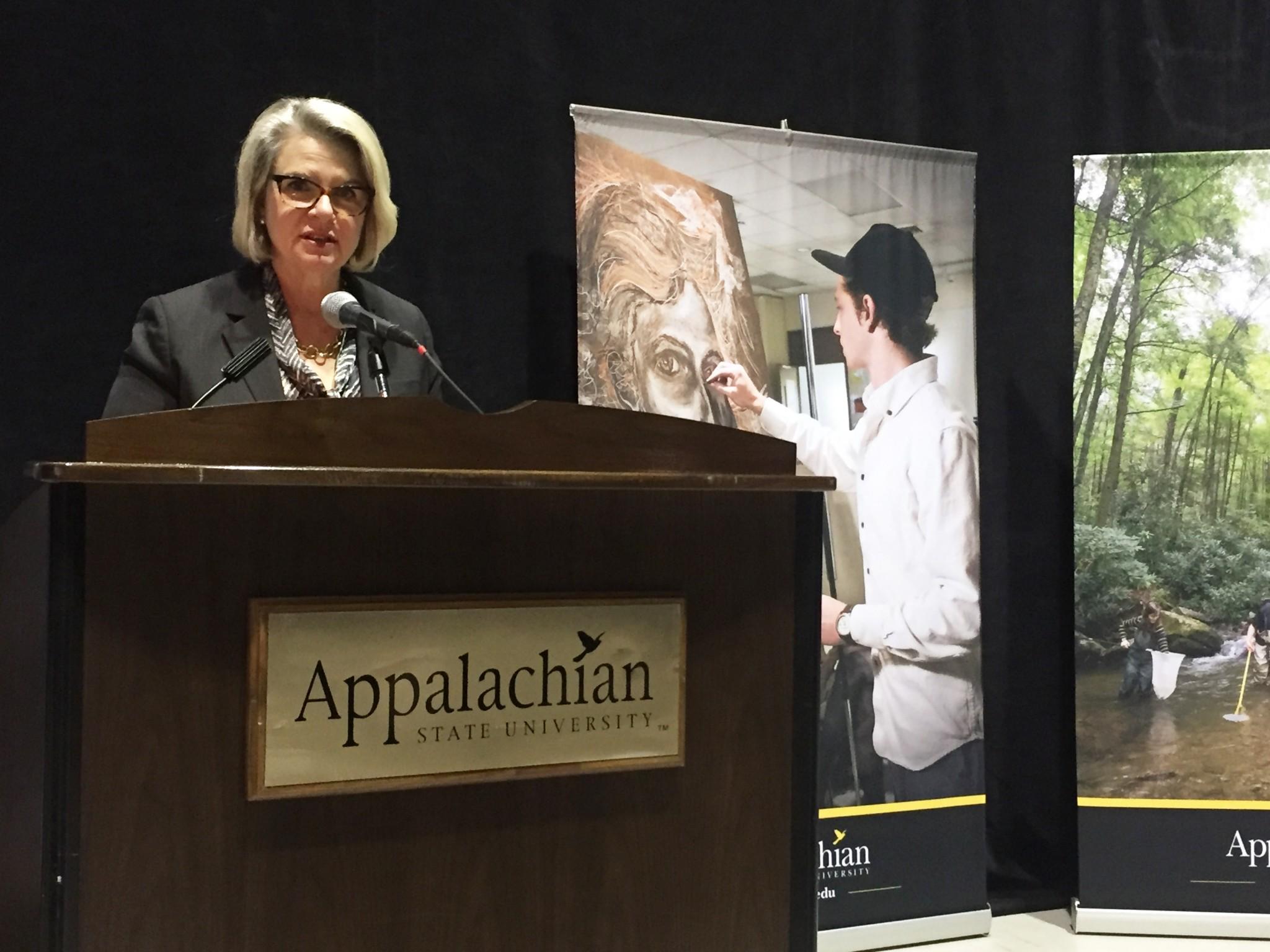UNC President Margaret Spellings shared her impressions of Appalachian State University, as well as larger issues of concern to the UNC system, in a press conference at Holmes Convocation Center on Tuesday.
“This high-touch kind of feeling of this institution really comes through,” Spellings said. “I heard staff and faculty say we take care of each other. There is just that spirt, that camaraderie, that is, I think part of the culture here at Appalachian and it really is palpable.”
Spellings attended the unveiling of the future site of the College of Health Sciences Monday, and said she was proud to see the project be among the first funded by the N.C. Connect bond, which passed last month.
Reflecting on her trips to other campuses, Spellings cited college affordability, access and opportunity as major issues that have been raised.
“I’ve been asked, as we head into a legislative session, to tell the story and be the advocate on behalf of the issues here, which I intend to do,” Spellings said.
Spellings described faculty and staff pay as the “number one priority” for her.
After her planned remarks, Spellings took comments from press on a number of issues:
On Appalachian State Faculty Senate Resolution raising questions about Spellings’ selection as president: “I’m certainly aware of the resolution, and would say as I’ve said as I’ve traveled around the state, to give me a chance. Of course I want to listen to people who have maybe questions about my background, and differing views, as I hope they will listen to me.”
On House Bill 2: “Even in this short time, I think my outspokenness on House Bill 2, in opposition to it, which is not to say that we are going to pick and choose about which laws we follow, but clearly I do not think it is something constructive or productive for this university system. I think this has sent a message as to how I feel about this issue.”
On concerns raised by for-profit background on her vision of public education: “I’ve spent my life, my whole career, almost all my career in public service and in education, so there is no more fervent advocate for the value of public higher education and public education than Margaret Spellings. When people make those sorts of observations or criticisms, I ask them to give me any evidence in my background that I am a privatizer.”
On the idea of students as customers: “If you look up customer in the dictionary, I think you will find that it is essentially the person who is the recipient of a service or a product or an enterprise. S0, I think we have to keep that individual, whatever we call that person, at the forefront of our work. There is a centrality of the student as our priority in these systems. That is all I mean to convey when I use language like that, and I think the vast majority of citizens understand that.”
On challenges of growth at Appalachian State, UNC system : “We have to think about where is the capacity in our system that exists. How can we drive students there? How do we manage growth in institutions that are landlocked? How do we use technology and other innovations to grow our student base while keeping our student base, while keeping our footprint manageable? Those are the challenges before us, and all of the chancellors and the policymakers in the state.”
On increasing funding to Appalachian State, other schools: “I think we have to look at our funding model generally. We have to be precise about what we expect for our state, what we need for our state. It’s been a long time in our country since we backed up far enough to say, ‘What do we want of our higher education system, and how do we put our money where our mouths are around those goals?”
On the liberal arts: “As a liberal arts graduate myself, and the mother of two liberal arts graduates, I would say that I put my own money where my mouth is in that regard. I know that we can produce great students from every field that are highly equipped to compete in the world. And, we can also produce students who are unequipped in every discipline to compete in the world. So, this is a false argument in my view, about liberal arts or non-liberal arts.”
On the strengths and challenges of Appalachian: “Yes, you’re on the low end of the per capita funding, but I think that almost is taken as a challenge to get as much productivity as you can for those dollars. That kind of owning of responsibility, in that regard, I heard a lot of that on the pride front. On the challenge part, again investment, telling our story, advocacy and there are calls for me to be their leader in doing those things.”

